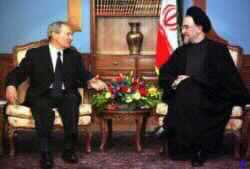Saudi Arabia and Iran Sunday backed a Turkish plan to hold a regional summit to discuss ways to avert a U.S.-led war on neighboring Iraq. NATO member Turkey said Thursday it had invited the leaders of Syria, Jordan, Iran, Egypt and Saudi Arabia to Ankara this week for the talks. Syria has offered to host a meeting of foreign ministers to help prepare for the summit.
"We welcome the conference in Turkey and all efforts and meetings that aim to protect Iraq, its people and the region from wars," a Saudi diplomatic source said.
Iran also said it welcomed the meeting.
"Such meetings are useful and it does not matter where they take place," the official IRNA news agency quoted Iranian Foreign Ministry spokesman Hamid Reza Asefi as saying.
The United States has asked several of Iraq's neighbors for assistance to launch a possible strike on Iraq, which it accuses of harboring weapons of mass destruction.
But most of Iraq's neighbors strongly oppose a U.S.-led attack and fear the Arab country could fragment chaotically into ethnic and religious cantons, wreaking havoc on a delicate regional balance.
Egypt said it had accepted Ankara's invitation and dismissed speculation the meeting would discuss the possibility that Iraqi President Saddam Hussein might step down and go into exile.
In a flurry of Arab diplomacy to avert a war on Iraq, Syrian Foreign Minister Farouq al-Shara visited Iran and Saudi Arabia Sunday to drum up support for the summit.
Shara met Saudi Crown Prince Abdullah bin Abdul-Aziz, and delivered a letter to him from Syrian President Bashar al-Assad, the official Saudi Press Agency (SPA) said.
SPA did not give further details but earlier the Saudi diplomatic source said Shara would hold talks with Prince Abdullah on Iraq and ways to avoid a war, before leaving the oil-rich kingdom Monday.
Prince Abdullah also held talks on the Iraqi crisis with Jordanian Prime Minister Ali Abu al-Ragheb Sunday.
A Riyadh-based diplomat told Reuters that Saudi Foreign Minister Prince Saud al-Faisal was expected to visit Egypt on Tuesday for talks on Iraq with Egyptian President Hosni Mubarak.
Iran is no friend of Saddam. The two countries fought an eight-year war in the 1980s in which one million people died. Hostilities ended in 1988 but the two neighbors have still not signed a peace treaty.
Like Damascus, Tehran is also a sworn enemy of the United States, which it accuses of backing Saddam in the war against Iran to undermine the Islamic Republic.
"The bad record of the Iraqi government in the region should not obscure our understanding of the dangers of the new American plans," Iranian state television quoted National Security Council chief Hassan Rohani as saying Sunday.
"America wants to bring about regime change in small regional countries and redraw the region's geopolitical map."
PHOTO CAPTION
Iranian President Mohammad Khatami (R) talks with visiting Syrian Foreign Minister Farouq al-Shara in Tehran on Jan. 19, 2003. Al-Shara was in Iran to drum up support for a meeting of regional foreign ministers to discuss the crisis in Iraq. The foreign ministers meeting would be a prelude to a planned summit of regional leaders due to be hosted by Turkey. (Stringer/Iran/Reuters)
- Author:
& News Agencies - Section:
WORLD HEADLINES


 Home
Home Discover Islam
Discover Islam Quran Recitations
Quran Recitations Lectures
Lectures
 Fatwa
Fatwa Articles
Articles Fiqh
Fiqh E-Books
E-Books Boys & Girls
Boys & Girls  Hajj Rulings
Hajj Rulings Hajj Fatwas
Hajj Fatwas














